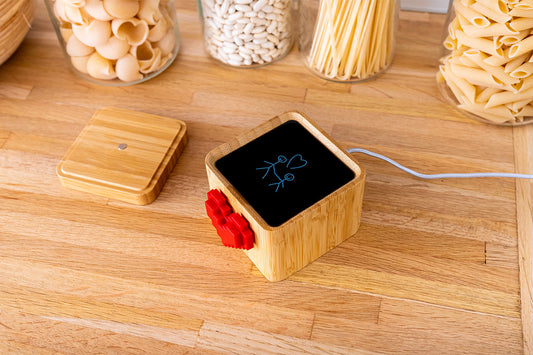Learning to navigate life as a military spouse has its own set of challenges. You must deal with many different issues when your significant other is a service member, such as medical care, childcare, and housing. Then sometimes, you and your spouse face deployment, which can add even more challenges.
However, staying connected with your military spouse doesn’t have to be one of these challenges. Thanks to modern technology, you can still communicate with your spouse in (almost) any part of the world. Although there may be times when phone calls and video chats are unavailable, there are still plenty of other options when it comes to long-distance communication.
Our team at Lovebox has put together some tips on the best way to stay connected with your military spouse in anticipation of their arrival back home.
How Can You Stay Connected With Your Spouse During Deployment?
Military life can look different for every couple. Depending on the location of your spouse’s installation, the demands of their job, whether they’re in active combat, their rank, and the level of secrecy of their mission, a few days may go by before you can speak to each other. It can also be challenging to find the right time due to time differences and daily demands in both of your lives, but after some creativity and planning, you will find the perfect time and method to communicate with your spouse.
4 Ways To Communicate With Your Spouse During Deployment
Snail Mail: Mailing a love letter to your military spouse may seem old-fashioned at first, but there’s nothing they would cherish more than a handwritten letter from the person they love. Send a letter to encourage them, update them, and tell them how much you miss them. If you have children, it’s also a great way to get the kids involved and have them write their own letters or draw a picture if they are too young to write. Your handwritten love letters will one day be a reminder to each other of your love during challenging times.
Email: Your spouse may not have access to the internet all the time, but when they do, email is a reliable way to stay connected with your military spouse during times of deployment. Additionally, email is one of the best ways to communicate when sharing important family news or life updates. Due to its consistency, email is perfect for sharing essential information.
Social Media: There may be pros and cons to couples using social media, but social media can be beneficial for long-distance military couples to stay connected. Facebook messenger and Instagram DMs are some of the best ways to send messages. Snapchat is also a great way to send pictures of each other’s day to feel involved. Not all areas have reliable internet access for social media, but usually, short messages would load correctly.
Video Chat: Skype and Zoom are a couple of video call platforms you can use to have a face-to-face conversation with your spouse during deployment. You can use the webcam on your computer or phone to connect with them. There isn’t always great reception for video calls, but if it is an option, video chats are a fantastic way to feel close and strengthen your bond as a couple.
How Should You Manage Realistic Expectations During Deployment?
With so many forms of communication at our fingertips, it may seem as though it’s not possible for there to be a lack of communication at times. But unfortunately, it’s not always feasible to hear from your spouses in military families. Lack of internet access, the secrecy of the mission, long hours of full-time duty, and conflicting schedules are just a few factors that could affect your communication. One of the most important things to do with your spouse before deployment is to discuss how you will both manage your expectations.
4 Ways Ro Manage Your Expectations During Your Spouse’s Deployment
Discuss Your New Way of Life: Have a conversation about how you will both manage feelings of loneliness if there are days or even weeks before you can talk to each other. One way to continue communicating with a sense of normalcy is to continue emailing or social media messaging even when the other spouse may not have internet access. Then, when they are online again, they can read your messages and feel caught up in your life. Continuing to communicate is also a great way to process your own emotions while spending time apart.
Set a New Routine: Due to crazy schedules and different time zones, setting up a new routine may be necessary to cope with any stress, anxiety, or loneliness during the first weeks of your spouse’s departure. So take time to sit down and work on a new message or voice chat calendar and what your communication will look like while they are gone.
Then, you and your spouse can absolutely get through this time together! Of course, you will have to make some daily adjustments to your life, such as staying up later or getting up earlier, but as long as you both talk it through before the big transition, then you’ll be good to go!
Give Yourself Time to Adjust: Keep in mind it will take a few days or sometimes a few weeks to adjust to your new way of life. Your spouse will have to adjust as well, but they may be so busy and tired from their deployment they will most likely process the change a little differently. So allow yourself some additional time to give yourself time to process your new way of staying connected.
In addition, if you’re struggling with sadness and loneliness during your spouse’s deployment, resources like a support group or family support center may help. Groups and support centers make it easier to adjust to life as a military spouse.
Focus on the Positive: As difficult as it may seem to focus on the good during your spouse’s deployment, there is always something to be grateful for during times of change. Although you may not always be able to talk, long-distance couples have often found that they could strengthen the bond as a couple and maintain a closeness they’ve never experienced during their time apart.
Taking time to entirely focus on each other and practice active listening — not being distracted by our surroundings — is often difficult to practice when your spouse is at home. However, during deployment, your communication can be more meaningful than ever.
Sending Care Packages To Stay Connected to Your Spouse During Deployment
Care packages and other mail are excellent ways to stay connected with your spouse during the countdown to their homecoming. Members of the military community miss many items from home and would love to receive them in the mail while they are gone. Sending physical is strongly encouraged to remind those deployed how much they are loved and missed.
It’s also a huge encouragement to boost their mood. Be sure to get an updated list of what items are prohibited and what things are encouraged to send, which may be strict depending on your spouse’s location. In addition, they may not always get their packages on time. However, sending a care package is always encouraged.
4 Ideas for Putting Together a Military Care Package
Fill It Up: Time to start packing your care package! With so many options and items, your spouse may need or like, sometimes it can be challenging knowing what to pack. The best rule of thumb is to keep a list of what you send and rotate your items in each care package.
For example, it’s best to add a few necessities to each box, but one month you may add books and games, and then the next month, you could include stationery and pictures for them to hang up. Of course, always ask your spouse first what they would like or need before packing your box because you never know what they may need.
If you still aren’t sure what to send, here’s a list of a few items to get you started.
-
Necessities – lip balm, sunscreen, socks, underwear, personal hygiene items, chaffing powder, dental floss, toothpaste, toothbrush, cotton swabs, lotion, disposable razors, shampoo, tissues
-
Personal care – eye drops, band-aids, moleskins, athletes foot ointment, pain relievers, packaged baby wipes
-
Entertainment – a deck of cards, puzzles, poker chips, paperback books, crossword puzzles, travel-size board games, magazines, comic books
-
Non-perishable food – non-melting candies, cookies, snacks, beef jerky, trail mix, salsa (wrapped thoroughly in plastic bubble wrap), nuts, protein bars, tuna,
-
Powdered Drink Mixes – hot chocolate mix, tea bags, powdered milk, and creamer, instant coffee
-
Stationery – envelopes, paper, note cards, address labels
-
Photos and office supplies – cute couple pictures or scrapbook, memorabilia, sticky notes, index cards, pens, pencils, journals, notebooks
The location and region of your spouse’s location will depend on whether or not you can send these items. However, this list is a good starting point for deciding what they may need during their deployment. It’s best always to double-check what the prohibited items are before making any purchases. Whatever you choose to send your spouse your care package will be sure to bring a smile to their face.
Ask Others To Join in the Fun: Even though you are probably sending your spouse more care packages than you can count during their deployment, sometimes it’s more fun to get a group of people together who volunteer to help assemble your care package. You could even make a night of it and order pizza while you put together your spouse’s care package. Also, it is often easier to divide up the cost of the items and postage.
Assembling care packages can be fun for everyone, but it also helps you feel inspired knowing so many people care about you and your spouse! To make your care package even more meaningful, try adding cards from your spouse’s mom, dad, and any other family members.
Give Your Care Package a Theme: If you’re sending a care package during a holiday such as Valentine’s Day or your spouse’s birthday, decorate their care package to give it a fun theme. For example, for St. Patrick’s Day, you could decorate the inside of the box green and include fun candy and other items. Keep in mind it might take a while for your packages to be delivered, so be sure to plan ahead.
Of course, be careful how you organize your box, but sending fun themes during holidays helps your spouse feel festive and a part of your life no matter the distance apart. Celebrating any special occasion or holiday will undoubtedly bring a smile to your soldier’s face.
Send a Special Date Night Care Package: A super fun care package to send to your spouse is a romantic date night package if they are in an area where video chats are accessible. For example, you could send fun candies and cookies and some artificial flowers or other items they could decorate their table. Then after they receive their date night package, set up a table and have a fun virtual date night together! One of the best ways to stay connected to your military spouse is to make sure you are still romancing each other during their deployment. You might have to get creative, but there’s always a way to have a fun date night, even during deployment!
How Can You Get Your Friends and Family Involved in Staying Connected With Your Deployed Spouse?
During your spouse’s deployment, it really does take a village for everyone to stay connected and feel part of your family’s life during this challenging time of transition. If you and your spouse have children, they may find it challenging to understand the change and find ways to stay connected. Our time has put together a few ways your friends and family can stay connected to your deployed spouse.
4 Ways for Your Friends and Family To Stay Connected to Your Deployed Spouse
Make a Sign-Up Sheet for Care Packages: During your spouse’s deployment, your friends and family may want to send them a care package. An excellent way to organize to make sure they have a care package regularly is to set up an email or virtual sign-up sheet for monthly care packages.
The people who love and care about you and your spouse most would love to get involved in feeling more connected! It might be a good idea to share a list of essential items they may like or need and a list of prohibited items they are not allowed to receive.
Encourage Your Friends and Family To Send Cards and Letters: Deployment can be lonely and frustrating. What better way for your spouse to be encouraged than to consistently receive sweet notes and cards reminding them they are loved and thought about regularly. Staying connected with your military spouse doesn’t have to mean spending a lot of time or money on a gift. Let your friends and family know a simple card would mean the world to your deployed spouse.
Host a Virtual Party and Invite Everyone: If your deployed spouse has access to reliable and consistent internet, then a great way to stay connected with everyone is to host a virtual party to bring a smile to their face. Find a time that works best for your deployed spouse’s schedule and availability and send an invite to join your virtual Zoom or Skype party.
Invite whomever your spouse would love to see and let the fun begin. Your virtual party could be for their birthday, anniversary, or other special occasions, or it could just be for fun on a random weekend to lift their spirits. You know your spouse best when it comes to what they need, so get ready to have fun because it’s time to party! If your spouse is a deploying parent, including your kids in the virtual party gives them a chance to stay connected during deployment.
Create a Memory Box: When there are special occasions in your life at home, have a box set up and have your friends and family write little notes and stories to your spouse. Then, after their deployment is over, your spouse will be able to sit down and read all the kind notes of special moments they missed while they are away.
It doesn’t make up for them not being in person, but they will feel a part of what they missed and know they were loved and thought of constantly during their deployment. Have fun with the box and the notes! Put little stickers and reminders on the messages, so your spouse will know what event was taking place and what was going on.
What About Staying Connected During the Tough Times of Your Spouse’s Deployment?
While your spouse is away, there may be times when you feel especially lonely or perplexed about a serious issue you aren’t sure what to do. Of course, it’s completely normal to feel disconnected at times! However, it’s best for you and your spouse to have a plan for when serious issues or moments arise during their deployment — taking the time to plan before deployment will alleviate any anxiety or fear that may creep in during challenging moments. The key is to have a plan, and you and your spouse can overcome anything.
4 Ways for Staying Connected During Tough Times
Have a Dedicated Communication Channel: You will want to set up a dedicated communication channel to talk about heavier issues before deploying. However, with so many options for communication today, you may wish to dedicate serious conversations to one particular medium. The choice is up to you and your spouse. One option that works well for serious discussion topics is through email. Email gives both parties time to read and process their response. Writing an email can also be therapeutic when processing your emotions and gives you time to get your feelings in check.
When talking about heavier issues on the phone, it is easy to say something hurtful or in anger. Plus, phone calls do not give the other person enough time to contemplate their response. Although, of course, if it is an urgent matter or update, your spouse needs to be aware of it right away, you often don’t have any other choice to call on the phone. So use your best judgment for the situation at hand, and you can’t go wrong.
Know When To Ask for Help: We all need someone to talk to when going through challenging moments. There’s never any shame in seeking help from a counselor or trusted friend, especially if your spouse’s deployment affects your mental health. There’s often nothing more encouraging than letting go of the weight of your worries when sharing them with a friend. If you find yourself needing a little extra help one day, don’t hesitate to pick up the phone and call a neighbor or friend. They’d be more than happy to help.
Not only does sharing your struggles help you, but it also keeps you connected to your deployed spouse. Sometimes your spouse needs to stay focused on their mission. And by sharing with loved ones, your spouse can remain focused on the task at hand.
Focus on the Positive: Yes, having a deployed spouse can be challenging, but thankfully in current times, you have so many ways to communicate and stay connected! During your spouse’s deployment, spend time with loved ones and friends you may not always have time to see when your spouse is at home.
Try a new hobby such as learning a new language, hiking, or going on a trip with your best friends. So, stay focused on the positive, and your deployed spouse will be back before you know it!
Have Fun With Communication: Suppose snail mail and video chats are getting tiresome during your spouse's deployment. We have the perfect answer for you! The Lovebox for Lovers — the sweetest gift for your deployed soulmate — is a unique connected messaging device that pairs with an app to go beyond regular communication. The Lovebox for Lovers delivers instant expressions of affection no matter the distance.
Send your deployed spouse a fully customizable Lovebox to have a special way to communicate just between the two of you. What better way to stay connected with your military spouse than to send romantic messages, stickers, and drawings to show how much you miss them in the cutest way possible! You never have to worry about forgetting to send them cute messages every day because you can create your messages and schedule when you send them!
Summary
These are our best ways for staying connected with your military spouse during times of deployment. First, take some time to talk to your spouse to find what will work best for you as a couple. Then make sure you and your spouse regularly find time to communicate. Deployments can be challenging, but you will have all of the tools you’ll need to keep your relationship strong through regular communication and a little creativity. In addition, the months apart during deployment will strengthen your bond as a couple.
Military deployments can make staying connected a challenge, but before you know it, your military spouse will be back in your arms, and it won’t even seem like you were apart!
Sources:
35 Tried and True Ways to Keep Your Sanity While He's Deployed | Military.com
How To Keep a Relationship Strong During Deployment | Military One Source
Military wives' 21 best tips for dealing with a spouse's deployment | Today














